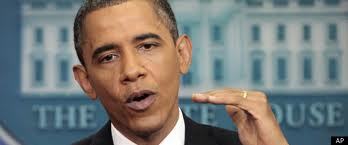President Obama tells the nation that Congress must increase the debt limit because they “should pay the bills that they have already racked up.” Let me translate that into household economics.
You find yourself reaching the debt limit on your credit card. But you have become addicted to spending each month two thirds more than you earn. So you got to keep charging on that card.
So you write to the credit card company demanding a debt limit increase “so you can pay the bills you have already racked up.” Would that work? Or would the credit card company write back and say you cannot pay the bills you have already racked up by continuing to charge more?
President Obama’s argument makes no more sense than that. Reaching the national debt limit now over $16 trillion dollars does not mean that the federal government cannot pay the bills it has already racked up. It just means that it cannot borrow still more.
Federal individual and corporate income taxes, and excise taxes, are more than 6 times greater each year than the interest on the national debt. So if President Obama wants to focus on paying the bills we have already racked up, he doesn’t need to borrow still more to do that. That would only rack up still more bills.
And that is why refusing to raise the debt limit still more, beyond 100% of what all of America even produces in a year, as President Obama wants to do, does not mean defaulting on the national debt. Quite to the contrary, increasing the debt still more makes future default only more likely.
But President Obama knows from long experience that he does not remotely need to make sense when he speaks. He has been telling us for more than four years now that we must increase income taxes on the rich, so they can pay their fair share. Even though his own federal government reports that the top 1% of income earners pay 39% of all federal income taxes, yet earn only 13% of the income.
In contrast, the middle 20% of income earners pay just 2.7% of all federal income taxes, while earning I5% of the income. So the rich pay 15 times as much in federal income taxes as the middle class, even though the middle class, defined as the middle 20% of income earners, earns more income than the rich, defined as the top I% of income earners. Moreover, the top 20% of income earners pay 94% of federal income taxes, which is close to double their share of income. Yet, the bottom 40% of income earners, instead of paying some income taxes to support the federal government, are paid cash by the IRS equal to 10% of federal individual income taxes on net.
This is all official IRS data, as reported by the Congressional Budget Office. So don’t try to tell me these established, official facts are false, or that I am lying, or that someone must be paying me to lie. If you feel uncomfortable with these facts, then change your hopelessly outdated, late 19th century, political philosophy.
In the face of this data, any reasonable person would say that the rich pay far more than their fair share. Only a Marxist would say that this is “unfair”, because under Marxist philosophy it is “unfair” that the top 1% of income earners earn any more than anyone else. If you disagree, what is your explanation for Obama continuing to repeat the proven false assertion that the rich do not pay their fair share?
President Obama tells us that he will not negotiate with House Republicans over spending cuts to go with increasing the debt limit. That is to the good, because addressing America’s gathering national debt crisis will not be achieved by more talking to President Obama behind closed doors at the White House.
The House of Representatives is part of the legislative branch, and so the House should do what the legislative branch does, which is legislate. The House Republican Majority should pass what it thinks is good policy for addressing America’s runaway spending, deficits and debt.
That means first that they should keep Obama on a short leash, passing only enough of an increase in the debt limit for a couple of months at a time. Secondly, Rep. Boehner should enforce his rule of one dollar in spending cuts for every dollar increase in the debt limit. House Republicans should include some of the spending cuts proposed by Obama’s own Simpson-Bowles Commission equal to the amount of every two month debt limit increase. Obama and the Democrats can then continually reveal to the public their real position, opposing any spending cuts, outside of national defense.
Thirdly, America’s gathering sovereign debt crisis needs to be addressed not just by spending cuts, but by policies to promote booming economic growth. So the House should pass the tax reform proposed by House Budget Committee Chairman Paul Ryan (R-WI). Just the opposite of President Obama’s tax policy so far, that would involve closing loopholes in return for reducing rates. That would be far better than Republicans just opposing proposals from Obama to reduce loopholes for the rich.
Ryan has proposed just two rates for the personal income tax — 10% for families earning less than $100,000 each year, and 25% for families earning more. The federal corporate rate would be reduced from 35% to the international average of 25%.
That would be the first middle class tax cut since the last middle class tax cut adopted in 2001 by the then Republican Congress, proposed and signed by President George Bush. The House should pass that along with an increase in the debt limit equal to the resulting increase in revenues over the next 10 years projected by Art Laffer’s economic consulting firm on a dynamic basis taking into account the increase in economic growth predicted to result from the reduced tax rates. Laffer’s record on predicting the revenues resulting from tax rate changes has consistently been far better than CBO’s record. To the extent that continues every year after these tax reform changes, Congress should redirect some of the budget for CBO to Laffer’s firm as payment for these and other continued projections.
If President Obama and the Democrats disagree with the House’s tax reform legislation, they can pass what they want through the Senate, where they still have a majority. The differences would then be resolved not behind closed doors in Obama’s White House, but by a House Senate Conference Committee. The debate would then reveal to the public where the two parties really stand, and the public can then judge which party’s policies are more likely to restore the American Dream and booming growth.
Similarly, the House should enact the fundamental reforms of the Fed proposed by Rep. Ted Poe (R-TX). Those would terminate the monetary policy discretion of the Fed, which have us on course for the return of booming inflation. The reforms would mandate that the Fed follow a price rule for monetary policy.
[First published at Forbes.]




